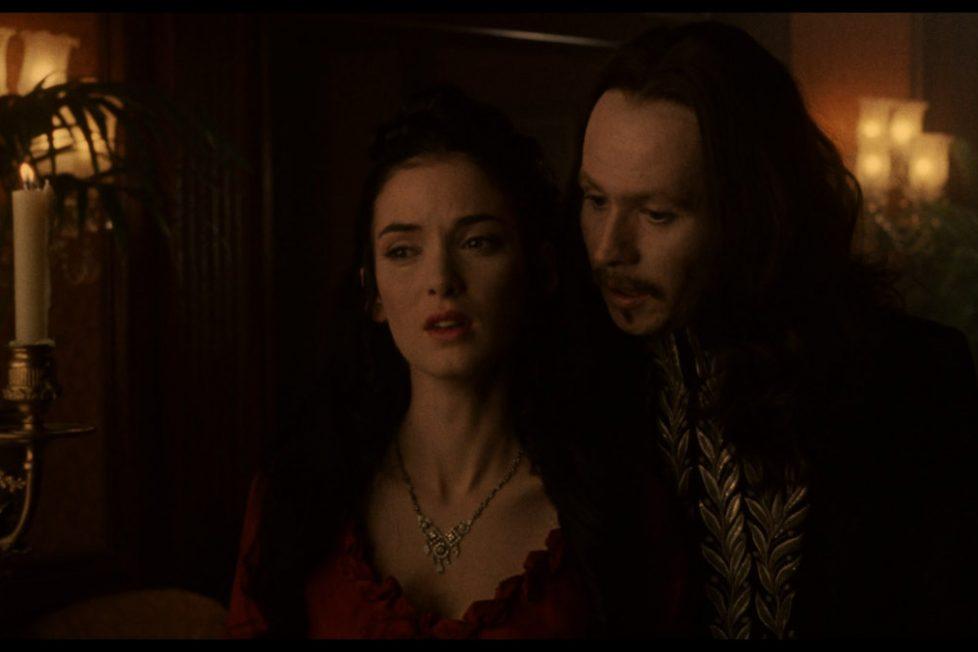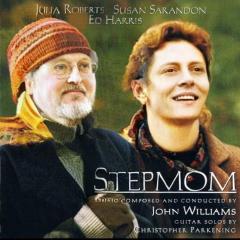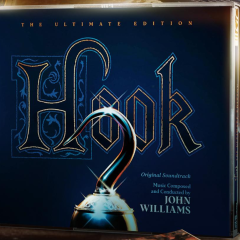-
Posts
461 -
Joined
-
Last visited
Reputation Activity
-
 Indianagirl reacted to TownerFan in Star Wars Episode VII: The Force Awakens (JJ Abrams 2015)
Indianagirl reacted to TownerFan in Star Wars Episode VII: The Force Awakens (JJ Abrams 2015)
This kind of sleek steadycam shot is something Lucas never did and I don't like it too much either. The visual lexicon of SW movies has always been very consistent throughout the six previous films--the kinetic camera movements were usually saved for big action set-pieces only, while the camera rarely moves too much around characters in dialogue or set-up scenes. Lucas (but also Kershner and Marquand) always used a very classical composition style and framing. It would be nice to see Abrams being consistent in his movie as well, but what do I know? I think it's gonna be a very different kind of Star Wars film, in terms of directing style.
-

-
 Indianagirl reacted to Jay in Sony is re-issuing the Star Wars scores on November 6, on Blu-spec CD
Indianagirl reacted to Jay in Sony is re-issuing the Star Wars scores on November 6, on Blu-spec CD
No, Sony would not need to be involved in any future releases once their contract ends. They never had the rights in perpetuity; It was a different contract because Lucasfilm didn't have their own music label, like the big companies do.
After 2017 or 2019, Sony's done forever with Star Wars music. Disney will own the rights to everything.
-
 Indianagirl reacted to Sharkissimo in Bridge of Spies FILM discussion
Indianagirl reacted to Sharkissimo in Bridge of Spies FILM discussion
That was more out of relief it was over.
-
 Indianagirl reacted to Muad'Dib in Bridge of Spies FILM discussion
Indianagirl reacted to Muad'Dib in Bridge of Spies FILM discussion
Indy 4 also opened with a standing ovation at Cannes, so take it with a grain of salt.
-
 Indianagirl reacted to Balahkay in The Force Awakens Disney Records OST
Indianagirl reacted to Balahkay in The Force Awakens Disney Records OST
The tracks have been revealed!
-
 Indianagirl reacted to crocodile in Is Disney ruining Star Wars for you?
Indianagirl reacted to crocodile in Is Disney ruining Star Wars for you?
In its defence, plane sequence itself is better than the entirety of Man of Steel.Karol
-
 Indianagirl reacted to Brónach in Is Disney ruining Star Wars for you?
Indianagirl reacted to Brónach in Is Disney ruining Star Wars for you?
Not so far.
JJ Abrams is kinda average, but I'm far more worried about, say, Colin Trevorow.
-
 Indianagirl reacted to MrScratch in Swing Swing Swing!
Indianagirl reacted to MrScratch in Swing Swing Swing!
I made a dance video of my son, set to "Swing Swing Swing!" Took me three months to film and over a month to edit. Just thought you fellas here might appreciate it.
-
 Indianagirl got a reaction from Not Mr. Big in Signature Piece of The Force Awakens?
Indianagirl got a reaction from Not Mr. Big in Signature Piece of The Force Awakens?
Why not? Unless you are saying there was more depth and intrigue to the music than there was the character. That I could see. I thought the music seemed to reflect more what the character was intended to be rather than what showed up on screen.
-
 Indianagirl got a reaction from crumbs in Signature Piece of The Force Awakens?
Indianagirl got a reaction from crumbs in Signature Piece of The Force Awakens?
I get there eventually
Although I can watch it. For me this is Speilberg's only real miss in his entire career.
-
 Indianagirl got a reaction from Cerebral Cortex in Signature Piece of The Force Awakens?
Indianagirl got a reaction from Cerebral Cortex in Signature Piece of The Force Awakens?
Why not? Unless you are saying there was more depth and intrigue to the music than there was the character. That I could see. I thought the music seemed to reflect more what the character was intended to be rather than what showed up on screen.
-
 Indianagirl got a reaction from crumbs in Signature Piece of The Force Awakens?
Indianagirl got a reaction from crumbs in Signature Piece of The Force Awakens?
Why not? Unless you are saying there was more depth and intrigue to the music than there was the character. That I could see. I thought the music seemed to reflect more what the character was intended to be rather than what showed up on screen.
-
 Indianagirl got a reaction from crumbs in Harry Potter: How Should it Have Sounded?
Indianagirl got a reaction from crumbs in Harry Potter: How Should it Have Sounded?
I don't understand what he's talking about either. It is like he is trying to appear smart by correcting his complaint with score that is already an important part of the movie.
-
 Indianagirl reacted to BloodBoal in Jerry Goldsmith - The Secret of NIMH (new Intrada Expanded)
Indianagirl reacted to BloodBoal in Jerry Goldsmith - The Secret of NIMH (new Intrada Expanded)
How can someone have seen The Secret Of NIMH and not remember anything about it?!
I guess there's only one thing left for you to do: rewatch it!
-
 Indianagirl reacted to Bespin in Star Wars Episode VII: The Force Awakens (JJ Abrams 2015)
Indianagirl reacted to Bespin in Star Wars Episode VII: The Force Awakens (JJ Abrams 2015)
The bad guys outfits of the original trilogy where inspired by Nazis... this one seems to be a little Mao-esque!
-
 Indianagirl got a reaction from Bespin in Star Wars Episode VII: The Force Awakens (JJ Abrams 2015)
Indianagirl got a reaction from Bespin in Star Wars Episode VII: The Force Awakens (JJ Abrams 2015)
It reminds me of something out of the old Soviet Union. The entire picture actually feels cold. You can relate to it very easily. The prequels in many instances were beautiful to look at but they didn't have spark a feeling that could easily be related to. IMHO
-
 Indianagirl got a reaction from Dixon Hill in What are your Top 10 film score action tracks NOT composed by JW?
Indianagirl got a reaction from Dixon Hill in What are your Top 10 film score action tracks NOT composed by JW?
In no particular order
https://www.youtube.com/watch?v=9BlUumhXw1Y
-
 Indianagirl reacted to KK in Female Composers
Indianagirl reacted to KK in Female Composers
No one's questioning the gender gap in the music industry. What's utter bull crap is that women are inherently designed to have a lower preference to leave a legacy behind...
Speaking of female composers, Jennifer Higdon is a good one!
-
 Indianagirl reacted to Dixon Hill in A.I. Artificial Intelligence (2001) - 2015 3CD set from La-La Land Records
Indianagirl reacted to Dixon Hill in A.I. Artificial Intelligence (2001) - 2015 3CD set from La-La Land Records
Goofy? It's utterly haunting.
-
 Indianagirl got a reaction from Bespin in SW original vs prequel scores
Indianagirl got a reaction from Bespin in SW original vs prequel scores
I'm not a prequel hater. I'm not naive either. The Originals were far superior to the prequels. The Scores as well as the films. That doesn't mean the scores for the prequels were bad. I think Across the Stars was a beautiful piece of Star Wars music. In my opinion John Williams writes to and defines what is on the screen better than any composer in history. Maybe a better way to put it is he musically interprets what is on the screen better than anyone I know of. He defines it. Who can think shark and not simultaniously think of the Jaws score? Admit it anytime you see a representation of a dinosaur, whether related to Jurassic Park or not, John's Jurassic score comes to mind. I think this is why the scores to the original trilogy are superior to the prequels. He is THE absolute master at musically interpreting what is on the screen.
I say this as one who does not have a background in music. But as a lover of films and film music....that's how I see it.
-
 Indianagirl reacted to gkgyver in Has getting the Expanded/Complete editions of film scores significantly changed your opinions about them?
Indianagirl reacted to gkgyver in Has getting the Expanded/Complete editions of film scores significantly changed your opinions about them?
Expanded scores never change my opinion on a score. When I buy expanded scores, it's because I already know previously unreleased music from the score, and want to have it.
-
 Indianagirl got a reaction from Jay in Hans Zimmer's Top 10 Scores
Indianagirl got a reaction from Jay in Hans Zimmer's Top 10 Scores
I'm going to take a stab at this because I'm a glutton for punishment.
I think Hanz Zimmer is a good film composer. He has his own style which may not be for everyone but he can churn out some interesting work. He is very good at what he does. The problem may be that what he does isn't what John Williams or Jerry Goldsmith or even James Horner did. It could be that a lot of the annymous comes from that we are living in an era where we don't get those types of scores very often anymore. In fact I feel like a lot of movies today don't even have scores. In many cases it's just noise. But I don't believe Zimmer falls into that category. I think the problem is that he is overflooding the market. And those movies that he doesn't do often sound like cheap imitations of him. Gone are the days of the great score that would knock your socks off and the entire world could hum by the mention of the films name. And that makes some people angry and Hanz Zimmer becomes the natural punching bag through no fault of his own. At least that's my theory.
I miss those old scores too. Here's hoping Star Wars the Force Awakens will be just that.
-
 Indianagirl got a reaction from Matt C in What scores are you most proud to own
Indianagirl got a reaction from Matt C in What scores are you most proud to own
I suppose, even though it is easy to own anything your heart desires via the internet, I look at film scores being rare in today's world because I don't know anyone outside of this board who listens to them. Let alone buys them. I listen to popular music today along with my friends as well but to me film scores are more special. Maybe I'm just weird but orchestrated music feels deeper and more emotionally complex than pop music. Well actually acknowledging that I don't think makes me weird. Even still buying and listening to film scores, despite them being more easily acquired in this age, feels rare and special to me. Perhaps that makes me weird lol
On another note I am definitely going to have to listen to Krull. It has been mentioned a lot since reading these boards.
-
 Indianagirl reacted to filmmusic in Blu-ray News and Deals
Indianagirl reacted to filmmusic in Blu-ray News and Deals
You know I'm against revisions but I would LOVE this (Ok.... NOT)





.thumb.gif.df2a851b259fbffe34b18fc1c796422a.gif)



